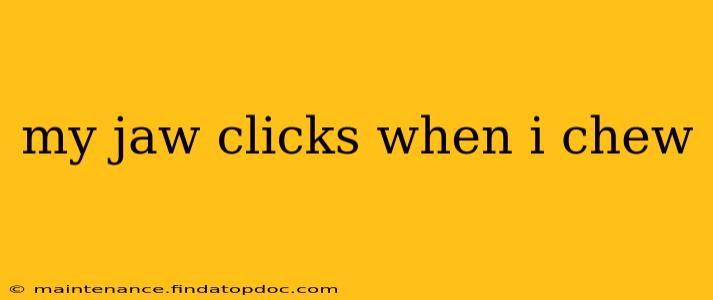Experiencing a clicking jaw while chewing is a common issue, often associated with temporomandibular joint (TMJ) disorders. This condition affects the jaw joint, connecting your jawbone to your skull. While a clicking jaw isn't always a cause for major concern, it's crucial to understand the potential causes and when to seek professional help. This comprehensive guide will explore the reasons behind clicking jaws, associated symptoms, and available treatment options.
What Causes My Jaw to Click When I Chew?
The most frequent culprit behind a clicking jaw is a problem with the temporomandibular joint (TMJ). This joint is complex, involving the interplay of bones, muscles, ligaments, and cartilage. Several factors can disrupt this delicate balance, leading to a clicking sound:
-
Disc Displacement: The TMJ contains a disc of cartilage that acts as a cushion between the jawbone and the skull. If this disc is displaced, it can cause clicking, popping, or even locking of the jaw. This is often the most common cause of clicking.
-
Ligament Issues: Ligaments support and stabilize the TMJ. Damage or stretching of these ligaments can contribute to joint instability and clicking.
-
Arthritis: Degenerative joint diseases like osteoarthritis can cause inflammation and damage to the cartilage, leading to clicking and pain.
-
Muscle Spasms: Overuse or stress can cause the muscles surrounding the TMJ to spasm, resulting in clicking and discomfort.
What Other Symptoms Might I Experience?
A clicking jaw is often accompanied by other symptoms, indicating the severity and underlying cause of the TMJ disorder. These can include:
-
Pain: Pain in the jaw, temples, or face is a common symptom. Pain can range from mild discomfort to severe, debilitating pain.
-
Jaw Locking: In some cases, the jaw may lock open or closed, making it difficult to eat or speak.
-
Headaches: TMJ disorders are frequently linked to headaches, especially those affecting the temples or sides of the head.
-
Earaches: Pain in the ear is another possible symptom, often related to the proximity of the TMJ to the ear canal.
-
Difficulty Chewing or Opening Your Mouth: This can make eating and speaking challenging.
How Can I Tell If It's Serious?
While occasional clicking may be harmless, persistent or worsening clicking accompanied by significant pain or limitations in jaw movement warrants a visit to a healthcare professional. Seeking professional help is especially important if you experience:
- Severe pain: Pain that significantly interferes with your daily activities.
- Limited jaw movement: Difficulty opening or closing your mouth fully.
- Locking jaw: Inability to open or close your jaw.
- Recurring headaches: Frequent or intense headaches associated with jaw clicking.
What Are the Treatment Options for a Clicking Jaw?
Treatment for a clicking jaw depends on the severity of the condition and its underlying cause. Options range from conservative approaches to more interventional procedures:
-
Conservative Treatments: These often involve pain relief medications (over-the-counter or prescription), heat or ice packs, soft food diets, and stress management techniques. Physical therapy may also be recommended to strengthen jaw muscles and improve range of motion.
-
Splints or Mouthguards: Custom-made mouthguards or splints can help realign the jaw and reduce stress on the TMJ.
-
Medications: Medications such as muscle relaxants or anti-inflammatory drugs may be prescribed to alleviate pain and reduce inflammation.
-
Injections: Corticosteroid injections can be used to reduce inflammation in the joint.
-
Surgery: Surgery is generally a last resort and is considered only in severe cases that haven't responded to conservative treatments.
Are There Home Remedies I Can Try?
Several home remedies might provide temporary relief from jaw clicking and associated discomfort. These include:
-
Applying warm or cold compresses: Alternating between warm and cold compresses can help reduce inflammation and pain.
-
Gentle jaw exercises: Specific exercises recommended by a physical therapist can help strengthen jaw muscles and improve range of motion. Avoid forceful movements.
-
Stress reduction techniques: Stress can exacerbate TMJ disorders, so incorporating relaxation techniques like yoga or meditation can be beneficial.
-
Maintaining good posture: Good posture can help reduce strain on the jaw and neck muscles.
-
Eating softer foods: Avoiding hard-to-chew foods can reduce stress on the TMJ.
When Should I See a Doctor or Specialist?
You should consult a doctor or specialist if the clicking is persistent, accompanied by pain, limits your jaw movement, or worsens over time. A dentist specializing in TMJ disorders (orthodontist or oral surgeon), or a physician specializing in facial pain may be able to provide a proper diagnosis and recommend the most suitable treatment plan. Delaying treatment may lead to more severe complications. Early intervention often results in better outcomes.
